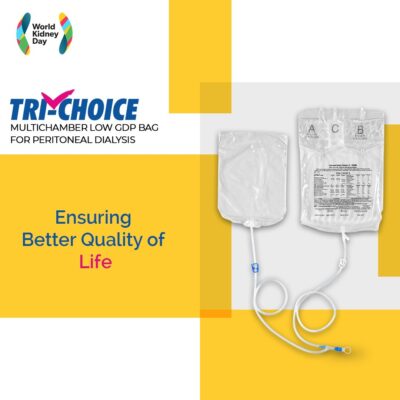Mitra Industries launches Innovative Peritoneal Dialysis Solution
The launch of triple chamber bag will revolutionize patient care It is a significant milestone in peritoneal dialysis treatment Mitra Industries today announced the launch of its innovative triple chambered peritoneal dialysis (PD) bag that has

The launch of triple chamber bag will revolutionize patient care
- It is a significant milestone in peritoneal dialysis treatment
Mitra Industries today announced the launch of its innovative triple chambered peritoneal dialysis (PD) bag that has a near-neutral pH and low glucose degradation products (GDPs). The use of this bag will help treating nephrologists enhance patient care and improve outcomes. The conventional PD solutions have acidic pH which has a deleterious effect on the functionality of the peritoneal membrane, the life line of PD.
Chronic Kidney Disease (CKD) is growing at a rapid rate and is fast becoming a public health challenge in India posing multifaceted threats to India’s health infrastructure and delivery systems. There is an alarming rise in the common risk factors like diabetes and hypertension and a critical shortage of donor kidneys for transplants. These factors have further exacerbated the situation, leaving many patients to rely on dialysis as their life-sustaining option.
Speaking about its innovative product, Nitin Mahajan, the Managing Director said, “Mitra Industries remains committed to advancing the field of nephrology through innovation and excellence. This cutting-edge product leverages advanced technology and scientific expertise to deliver superior outcomes for CKD patients who rely on peritoneal dialysis as their life-sustaining therapy.”
Dr. KS Nayak, the Chief Medical Advisor said, “Peritoneal dialysis is a crucial therapy that allows CKD patients to remove waste and excess fluid from their bodies, mimicking the excretory function of healthy kidneys. The innovative solution promises enhanced efficacy, improved patient outcomes, and improved quality of life, providing hope for nephrologists managing the complexities of chronic kidney disease treatments.”






